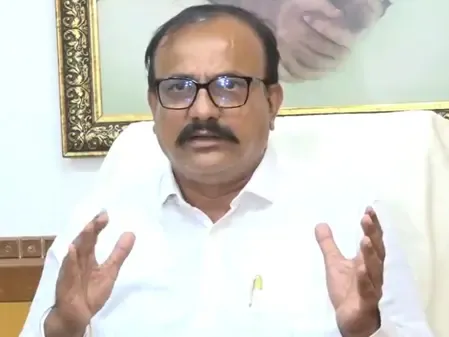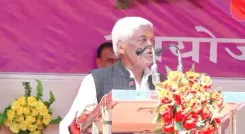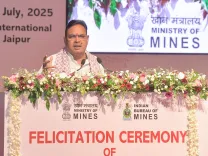Is the MSP Hike by the Centre Truly Significant Compared to the UPA Era?

Synopsis
Key Takeaways
- MSP hike by the BJP is deemed negligible.
- Farmers face rising input costs.
- Government procurement is often insufficient.
- Upcoming protest aims to challenge unfulfilled promises.
- Congress pledges to make MSP legally binding.
Mumbai, May 30 (NationPress) The President of the Maharashtra Pradesh Congress Committee, Harshwardhan Sapkal, claimed on Friday that the increase in Minimum Support Price (MSP) instituted by the BJP-led central government is insignificant and merely an illusion of generosity, similar to receiving a hollow promise.
He elaborated that the increase has been minimal and has effectively short-changed farmers. Between 2004 and 2014, the Congress-led Dr. Manmohan Singh government raised MSP by 120-150%, while the Modi government has only managed a 45% increase from 2014 to 2024.
Sapkal informed reporters that, despite a slight increase in MSP, the cost of agricultural inputs has soared dramatically.
“During the UPA era, diesel was priced at Rs 48 per litre, but now it has surged to Rs 96. Subsidies on pesticides, fertilizers, and electricity have been removed, and an 18% GST has been imposed on agricultural machinery, effectively exploiting farmers. Consequently, the rise in MSP is merely a symbolic gesture. Due to inflation, farmers aren’t genuinely benefiting from it. Agriculture, being the largest employment-generating sector and a key pillar of the economy, has been significantly neglected under BJP governance,” he remarked.
“In the 2023-24 period, India produced 47.37 lakh tonnes of jowar, yet only 3.23 lakh tonnes were procured by the government. Out of 376.65 lakh tonnes of maize, merely 5,000 tonnes were purchased. For bajra, the production was 107.16 lakh tonnes, but procurement was just 7 lakh tonnes. Of the 16.70 lakh tonnes of ragi produced, only 2.31 lakh tonnes were bought by the government. For chana, from 115.76 lakh tonnes produced, only 43,000 tonnes were procured. As a result, farmers are compelled to sell most of their produce at lower prices to private traders, leading to significant financial losses,” stated Sapkal.
In Maharashtra, Sapkal commented that the government announces procurement centers annually, but the process is fraught with inefficiencies. Even when these centers operate, their complicated procedures tend to favor traders over farmers.
“This year, the government set the MSP for soybean at Rs 4,800, but farmers had to sell it to private traders for only Rs 4,000. The Parliamentary Standing Committee on Agriculture had recommended a legal guarantee for MSP and the removal of taxes on agriculture and farmers, yet these suggestions have not been implemented. The Congress party pledges to make MSP legally binding, and if elected, it will uphold this promise,” he asserted.
Sapkal announced that the Congress has scheduled a ‘Kya Hua Tera Wada?’ protest on June 3 in Dabhadi, Yavatmal. During the 2014 election campaign, Narendra Modi held a ‘Chai Pe Charcha’ event in Dabhadi village, Yavatmal district, making grand promises to farmers—including doubling their income, offering MSP at 1.5 times production cost, implementing the Swaminathan Commission Report, and ensuring zero farmer suicides. Not a single one of these promises has been fulfilled in the past eleven years.
“Conversely, farmer suicides have escalated, with six suicides occurring daily. To address Modi’s unfulfilled promises, the Congress party will organize a padyatra on June 3 in Dabhadi village under the slogan, Kya Hua Tera Wada?” the Congress leader declared.
Sapkal addressed Chief Minister Devendra Fadnavis, who previously claimed, ‘I don’t permit any wrongdoing in my cabinet.’ However, he noted that his colleague, Agriculture Minister Manikrao Kokate, continues to make irresponsible and insulting remarks about farmers.
“First, he compared farmers to beggars; then he claimed that farmers utilize debt waivers for their daughters’ weddings and engagements. Most recently, he arrogantly questioned whether ‘panchnamas’ should be conducted for lumps of soil,” Sapkal noted. He demanded that the CM and Deputy CM take action concerning Kokate; otherwise, Congress and farmers will take necessary steps.





